Support justice-driven, accurate and transparent news — make a quick donation to Truthout today!
Former President Donald Trump may be focused on his Senate impeachment trial this week, but another legal matter may soon be on his mind in the weeks ahead, as the office of Georgia’s secretary of state has announced it’s opening an inquiry into his conduct around the election results as well.
The former chief executive, in trying to overturn the outcome of several state elections in order to remain in office, made a number of calls to Secretary of State Brad Raffensperger in early January, seeking to pressure officials to respond to his unfounded complaints. Raffensperger’s office recorded these conversations, perhaps knowing that the secretary of state might have a need for a record of them in order to challenge any contradictory comments from Trump later on.
During the calls, Trump urged Raffensperger to “find” votes for him, alleging without evidence that fraud in the presidential election within the state resulted in his loss to President Joe Biden.
As a result of those conversations, which appear to showcase the former president seeking to influence or coerce a Georgia state official to engage in fraud themselves, Raffensperger’s department announced on Monday that an inquiry would begin.
“The Secretary of State’s office investigates complaints it receives,” Georgia secretary of state spokesman Walter Jones said. “The investigations are fact-finding and administrative in nature. Any further legal efforts will be left to the Attorney General.”
Once the investigation concludes, the State Election Board (which is under the purview of Georgia’s secretary of state) will determine whether a criminal referral should be made to the state attorney general’s office, or to a county district attorney. County district attorneys can also determine on their own whether to proceed with criminal charges.
Fulton County District Attorney Fani Willis, whose county is mentioned by Trump in those phone calls, has said she would pursue a case against Trump if one is referred to her, calling the former president’s words “disturbing.”
“As I promised Fulton County voters last year, as District Attorney, I will enforce the law without fear or favor,” she said. “Anyone who commits a felony violation of Georgia law in my jurisdiction will be held accountable.”
During Trump’s calls to Raffensperger, the former president told the state official to “find the fraud” in the state. There’s no evidence that fraud played any role whatsoever in Trump’s election loss, and many of his claims have been proven untrue by state officials there.
In another call, Trump told Raffensperger to “find” 11,780 votes cast for him — the exact number that would be needed to overturn the result, and make Biden’s win a Trump victory instead.
Failure to appease Trump’s demands, the former president said in the conversations, could land Raffensperger and his lawyer in trouble, declaring that he was committing a “criminal offense” by not investigating the phony claims of fraud.
Many have criticized the calls made by Trump, noting that his words seem to have directly violated state election law. Georgia statutes specifically state that it’s a crime for anyone to solicit, request or command another person to engage in election fraud.
“The president asked, in no uncertain terms, the secretary of state to invent votes, to create votes that were not there,” Georgia State University law professor Anthony Michael Kreis, said to Politico after the revelation about the phone calls was made.
The attempt to get Raffensperger to alter the election results led some in Congress to call for Trump’s immediate removal from office at the time — even prior to a mob of his loyalists attacking the Capitol in early January.
“I absolutely think it’s an impeachable offense and if it was up to me, there would be articles on the floor, quite quickly,” Rep. Alexandria Ocasio-Cortez (D-New York) said of Trump’s conversations with Raffensperger.
Trump, for his own part, has defended the way he spoke to Raffensperger. “I thought it was a great conversation, personally,” he said in his speech on January 6, just prior to his loyalists attacking the Capitol building. “So did a lot of other — people love that conversation because it says what’s going on. These people are crooked.”
The phone calls themselves are likely to be discussed during Trump’s Senate impeachment trial this week, where the former president is being tried for having instigated his supporters to try and overturn the election’s outcome at the vote certification process in the Capitol. Indeed, they are included in the charging document, within the single article of impeachment made against him:
President Trump’s conduct on January 6, 2021, followed his prior efforts to subvert and obstruct the certification of the results of the 2020 Presidential election. Those prior efforts included a phone call on January 2, 2021, during which President Trump urged the secretary of state of Georgia, Brad Raffensperger, to “find” enough votes to overturn the Georgia Presidential election results and threatened Secretary Raffensperger if he failed to do so.
Press freedom is under attack
As Trump cracks down on political speech, independent media is increasingly necessary.
Truthout produces reporting you won’t see in the mainstream: journalism from the frontlines of global conflict, interviews with grassroots movement leaders, high-quality legal analysis and more.
Our work is possible thanks to reader support. Help Truthout catalyze change and social justice — make a tax-deductible monthly or one-time donation today.
